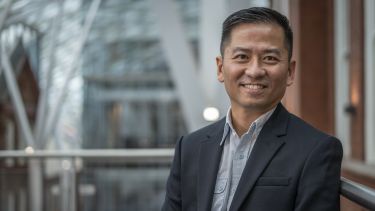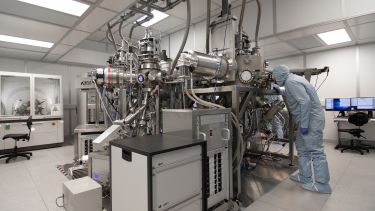Read the government's policy paper for the National Semiconductor Strategy
The global semiconductor industry is the backbone of modern technology, enabling the development of advanced electronics that permeate every aspect of our lives. Recognising the vital importance of semiconductors, the UK government has unveiled a new semiconductor strategy that promises to propel the UK to the forefront of this critical industry through £1 billion of government investment. The new strategy also means the work done by academics in the Department of Electronic and Electrical Engineering at the University of Sheffield to inspire and educate the next generation of engineers to join the semiconductor industry workforce is more important than ever.
Speaking in response to the launch of the strategy, Head of Department Professor Chee Hing Tan said:
At Sheffield, we have a long tradition of developing compound semiconductor theories, epitaxial growth and fabrication methods meaning that we have been able to provide a unique set of capabilities from theory to demonstrator. This has led to many exciting discoveries from quantum cascade and quantum dot lasers, bright LEDs, high performance solar cells and extremely sensitive avalanche photodiodes. These exciting research discoveries have now led to commercialisation through a number of spinouts from the University. More recently we have started a research group designing semiconductor chips to meet various demands on chips including AI and security. We are therefore well positioned to accelerate emerging technologies in semiconductors to consolidate UK leadership and help UK industry to bring exciting research from University to commercialisation, which aligns extremely well with the UK National Semiconductor Strategy.
Professor Chee Hing Tan
Head of Department of Electronic and Electrical Engineering, University of Sheffield
Semiconductors are the foundation of cutting-edge technologies such as artificial intelligence, quantum computing, 5G, Internet of Things (IoT), and autonomous vehicles. By strengthening its semiconductor capabilities, the UK can position itself as a global hub for technological advancements in these areas. This strategy opens doors to collaborations between academia, industry, and startups, fostering knowledge exchange and driving breakthrough innovations that will shape the future.
The National Epitaxy Facility, led by academics at the University of Sheffield, is mentioned within the government's strategy in section 7.2 - Research and Development, under the heading 'Government Support for Research and Innovation to date'. Jon Heffernan, Professor in the Department of Electronic and Electrical Engineering and Director of the National Epitaxy Facility said:
I'm delighted to see the government strategy on semiconductors is released today after much work and consultation. Semiconductor science and technology is not static and what is important now is that the strategy is not either. We must get started as soon as possible to build the unique innovation, design and manufacturing capabilities we need to make the UK globally competitive in the future of this technology. It is particularly pleasing that the government has recognised the critical role of R&D and skills development to build the pipeline of innovation that is needed.
Professor Jon Heffernan
Director, The National Epitaxy Facility, Sheffield and Professor in Department of Electronic and Electrical Engineering, University of Sheffield
Ben White is an alumni from the department and CEO of University of Sheffield spin-out company, Phlux. Ben spoke to Information Age for their piece on the news, and said of the scheme:
“In order to be effective, this investment will need to be carefully deployed and well aligned to the compound semiconductor industry needs in terms of access to research facilities, talent and trade links.
“I expect the National Semiconductor Infrastructure Initiative to play a critical role here, and I hope to see significant investment in facilities such as the National Epitaxial Facility for III-V compound Semiconductor Research in Sheffield that give rise to innovative IP rich companies Phlux, and enable them to be competitive on a global level.”
Professor John Goodenough joined the Department earlier in 2023 as a Professor and as Chair in Microelectronics Systems. He completed his PhD with the Department over 20 years ago, and now returns to the university bringing with him decades of knowledge from industry in the world of chips. You can read our news piece introducing him at this link. John was in Washington DC earlier in the year to meet with other industry leaders from the UK and the US to discuss semiconductor strategy. This fact-finding exercise informed the new semiconductor strategy during its creation, so John is understandably particularly pleased to see the launch of the strategy into the wider world. You can read John's thoughts from his time in Washington in this news piece.
Huge Congratulations to the Department of Science, Innovation and Technology team and a big thanks to the many industry colleagues who have contributed their time, expertise and sage advice.
Here at the University of Sheffield we are excited to move forward and enable the current and future UK industry in this space through continued innovative research in semiconductor design and manufacturing. We are looking forward to inspiring and educating the next generation of engineers to join the industry workforce and successfully implement the strategy.Professor John Goodenough
Chair in Microelectronics Systems and Professor in Department of Electronic and Electrical Engineering, University of Sheffield




